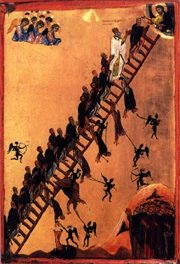Death & the Future Life: Theological & Pastoral Treatises
The Future Life According to Orthodox Teaching, by Dr. Constantine Cavarnos. The complete text of the book is forthcoming, courtesy of the Center for Traditionalist Orthodox Studies.
The Ladder of Divine Ascent
|
Our War is not Against Flesh and Blood: On the Question of the "Toll-Houses", by Protopresbyter Michael Pomazansky.
The Taxing of Souls, by Metropolitan Hierotheos of Nafpaktos. From Ch. 2 of Life After Death.
Answer to a Critic, by Fr. Seraphim Rose of Platina, author of The Soul After Death. This is Appendix III from the 1995 edition of his most popular work.
The Debate Over Aerial Toll-Houses, Extract from the Minutes of the Session of the Synod of Bishops of the ROCOR concerning Deacon Lev Puhalo's [now Archbishop Lazar] criticism of Fr. Seraphim of Platina's views.
The River of Fire, by Dr. Alexander Kalomiros. Note: This is a controversial article that may have questionable Orthodox soteriology. You should also consider reading a rebuttal of this article by Vladimir Moss entitled "The River of Fire Revisited".
The Parable of the Rich Man and Lazarus About Life After Death. From Life After Death, by Metropolitan Hierotheos of Nafpaktos
Cremation, by Protopresbyter George Grabbe. Appended to it is the 1932 Decision of the Sobor of Bishops of The Russian Orthodox Church Abroad concerning the same.
An Orthodox View of Heart Transplantation, by Metropolitan Philaret, of blessed memory.
On the Burial of the Heterodox, The Decision of the Synod of Bishops of the Russian Orthodox Church Abroad (1978).
There Is No Death: A Conversation With My Mother Before Her Repose, by Fr. Victor Potapov
Free Will and Death, an excerpt from The Mystery of Death, by Nikolaos P. Vassiliadis.
According to the teaching of the Fathers of the Church, the soul at its departure from the body, as well as when it is preparing to leave, senses the presence of the demons who are called customs demons, and is possessed with fear because of having to pass through customs....
Of course there are some who maintain that such notions as customs houses and aerial spirits have come into Christianity from Gnostic theories and pagan myths which prevailed during that period.
There is no doubt that such views can be found in many Gnostic texts, in pagan ideas which are found in Egyptian and Chaldaean myths. However it must be emphasised that many Fathers adopted the teaching about customs houses, but they cleared it of idolatrous and Gnostic frames of reference and placed it in the ecclesiastical atmosphere. The holy Fathers were not afraid to do such creative work.
—Metropolitan Hierotheos, Life After Death, Ch. 5, "The Taxing of Souls"
When my soul is about to be separated violently from the members of the body, then, O Bride of God, come to my aid; scatter the counsels of the fleshless enemies and shatter their millstones, by which they seek to devour me mercilessly; that, unhindered, I may pass through the rulers of darkness standing in the air.
—Theotokion from Friday Vespers, Tone 2
Perhaps no aspect of Orthodox eschatology has been so misunderstood as this phenomenon of the aerial toll-houses. Many graduates of today’s modernist Orthodox seminaries are inclined to dismiss the whole phenomenon as some kind of "later addition" to Orthodox teaching, or as some kind of "imaginary" realm without foundation in Scriptural or Patristic texts or in spiritual reality. Such students are the victims of a rationalistic education which is lacking in a refined awareness of the different levels of reality which are often described in Orthodox texts, as well as of the different levels of meaning often present in Scriptural and Patristic writings. The modern rationalistic over-emphasis on the "literal" meaning of texts and a "realistic" or this-worldly understanding of the events described in Scripture and in Lives of Saints—have tended to obscure or even blot out entirely the spiritual meanings and spiritual experiences which are often primary in Orthodox sources. Therefore, Bishop Ignatius—who on the one hand was a "sophisticated" modern intellectual, and on the other a new and simple child of the Church—can well serve as a bridge on which today’s Orthodox intellectuals might find their way back to the true tradition of Orthodoxy.
—Fr. Seraphim Rose of Platina, The Soul After Death, p. 66.


